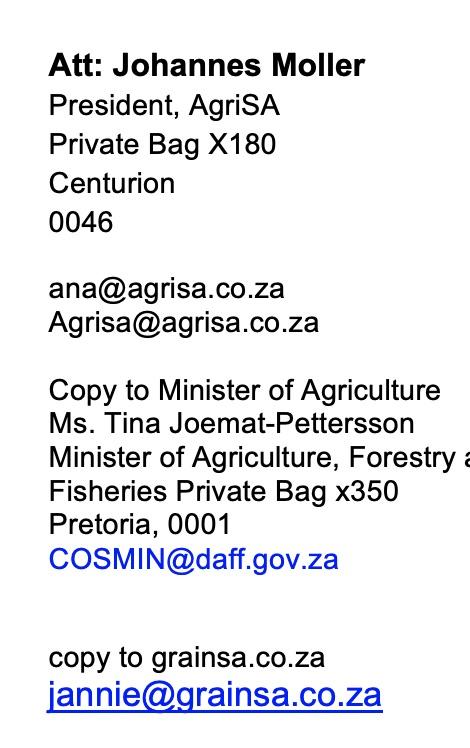Latest Resources

20 July 2013
Open letter to the National Chamber of Milling on GMO labelling and the development of a GM-Free ...
In July 2012 the National Chamber of Milling (NCM) posted a position on Genetically Modified Organisms (GMOs) on its website, in which it supports the principle of consumer choice and pledges to “encourage identity preservation within the grain supply chain to enable clear labelling of our product to the consumer market”. However, the biotech industry […]

5 July 2013
Africa demands Tiger Brands to Go GM Free
A letter from the ACB to Tiger Brands is supported by 39 African organisations working at grass-roots on issues of agriculture, consumer concerns and primary health care calling upon Tiger Brands to go GM free. Tiger Brands operates in 25 African countries and has ownership of a number of food manufacturers on the continent including […]

15 May 2013
STATEMENT BY CIVIL SOCIETY IN AFRICA
MODERNISING AFRICAN AGRICULTURE: WHO BENEFITS? African agriculture is in need of support and investment. Many initiatives are flowing from the North, including the G8’s “New Alliance for Food Security and Nutrition in Africa” and the Alliance for a Green Revolution in Africa (AGRA). These initiatives are framed in terms of the African Union’s Comprehensive African […]

2 April 2013
Civil Society Statement on COMESA Seed Trade Laws
This submission was made by civil society groups at a COMESA meeting in Lusaka during March 2013, in which serious concerns were raised about the COMESA seed trade laws as negatively impacting on small farmers in the COMESA region. Statement made by: Zambia Climate Change Network (ZCCN); East and Southern Africa Small Scale Farmers Forum […]

1 April 2013
Civil Society submission on SADC PVP Protocol
This document represents the submission by more than 80 civil society organisations from the SADC region, other parts of Africa and around the world to the SADC Secretariat. These groups representing millions of farmers have condemned the SADC draft Protocol for the Protection of New Varieties of Plants as spelling disaster for small farmers and […]

19 March 2013
Letters to UN High Commissioner for Human Rights for urgent interventions: Dow’s 2,4 D + gl...
Request for intervention to uphold the right of everyone to the enjoyment of the highest attainable standard of physical and mental health GM crops engineered to be resistant to three herbicides: 2,4-D, glufosinate-ammonium and glyphosate. Previous letters sent to: Mr. Anand Grover Special Rapporteur on the Right of Everyone to the Enjoyment of the Highest […]

15 November 2012
Comments on: Draft amendments to regulations to the Consumer Protection Act related to labelling ...
Comments on: Draft amendments to regulations to the Consumer Protection Act related to labelling of GMOs 8 November 2012. Read more.

6 November 2012
Submission by ACB and African CSOs to ARIPO on its draft PVP law and policies, November 2012
During October/November 2012, a number of African groups from civil society in Africa supported a submission to ARIPO on its draft policy and legal framework for PVP. In such submission, the groups pointed out that draft legal framework was not written with the interests of sub-Saharan African states in mind, particularly ARIPO member states. This […]

9 October 2012
Open Letter to AGRI SA: Response to its unsubstantiated claims about the benefits of GM maize in SA
Snippet from the letter below. The ACB read with interest an article published in the Business Day (2nd October, ‘AgriSA backs gene-modified maize’), in which you argue that the curtailment of cultivating GM maize in South Africa would lead to lower yields, higher maize prices, and an increase in the use of agricultural pesticides. You […]

25 September 2012
Open Letter to African Governments and AGRA (The Alliance for a Green Revolution in Africa)
The undersigned 28 civil society organisations support and represent the interests of smallholder farmers and livestock keepers from Ethiopia, Kenya, Mozambique, South Africa, Tanzania, Uganda, Zambia, and Zimbabwe, and are concerned with the conservation of agricultural biodiversity for livelihood security and food sovereignty. View the full statement here.
